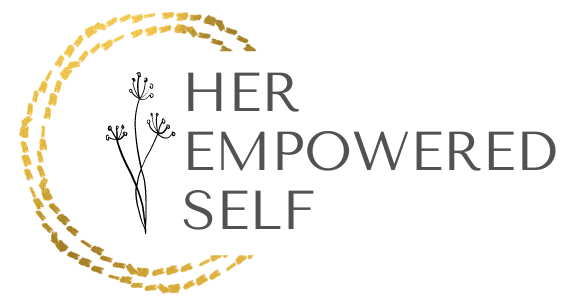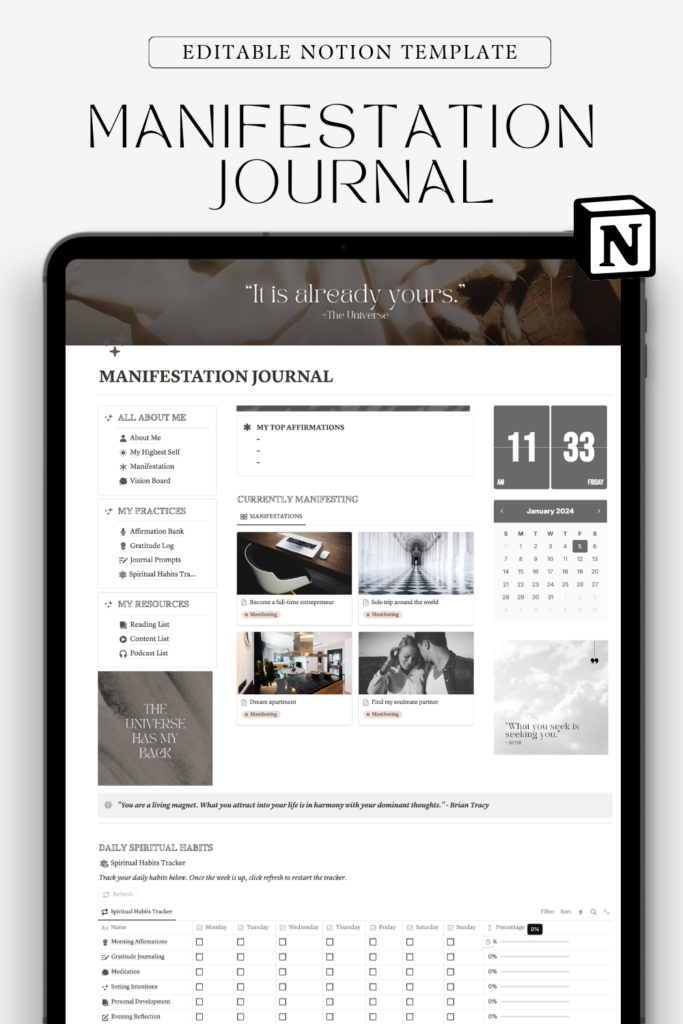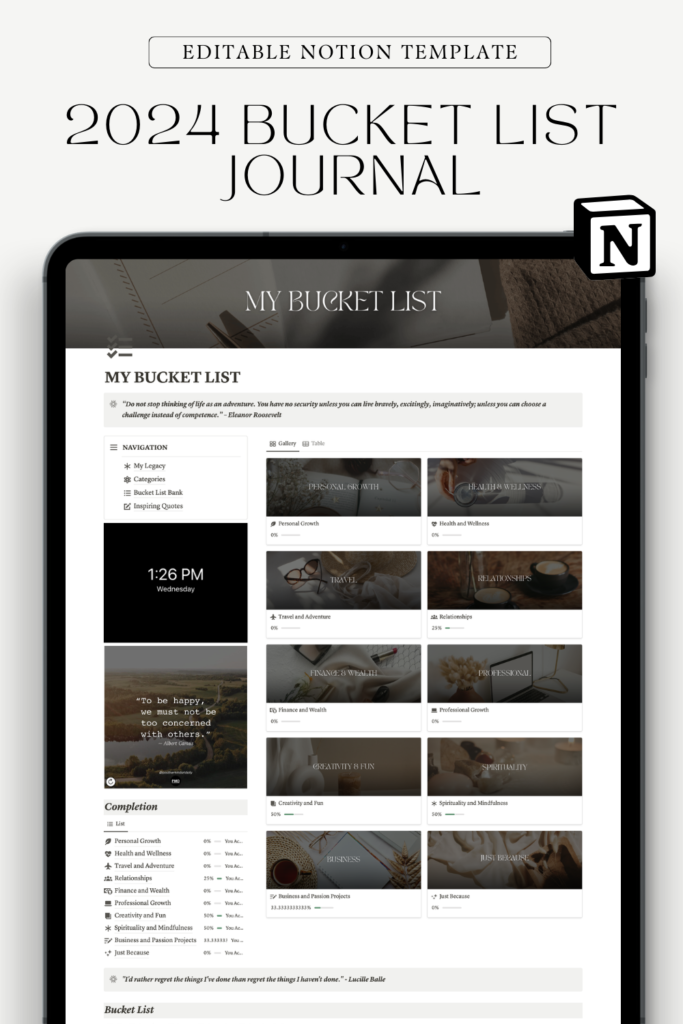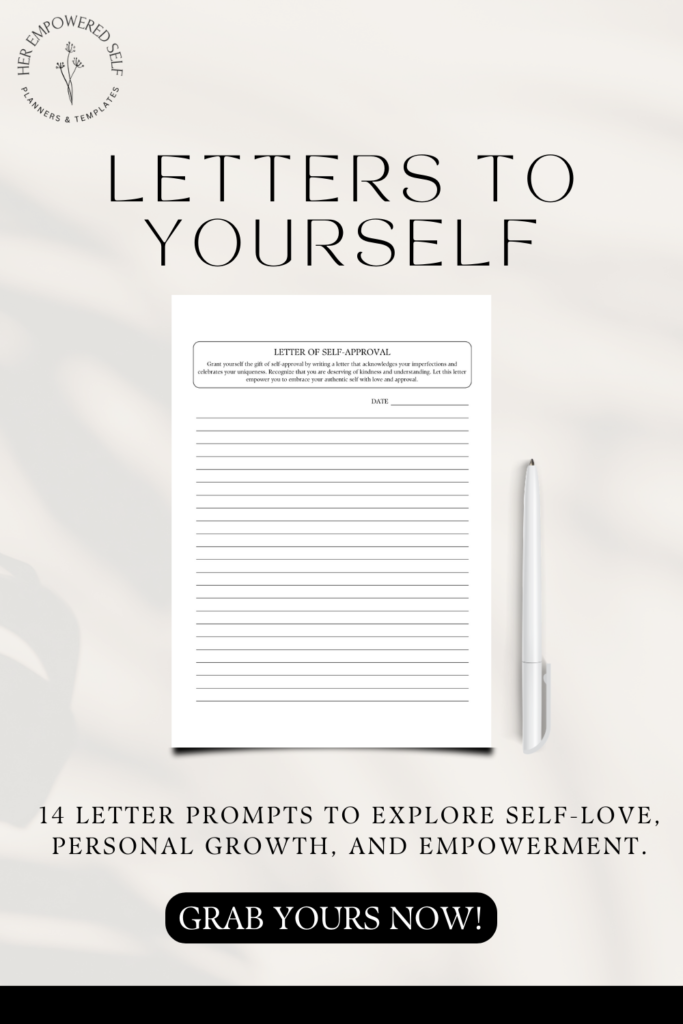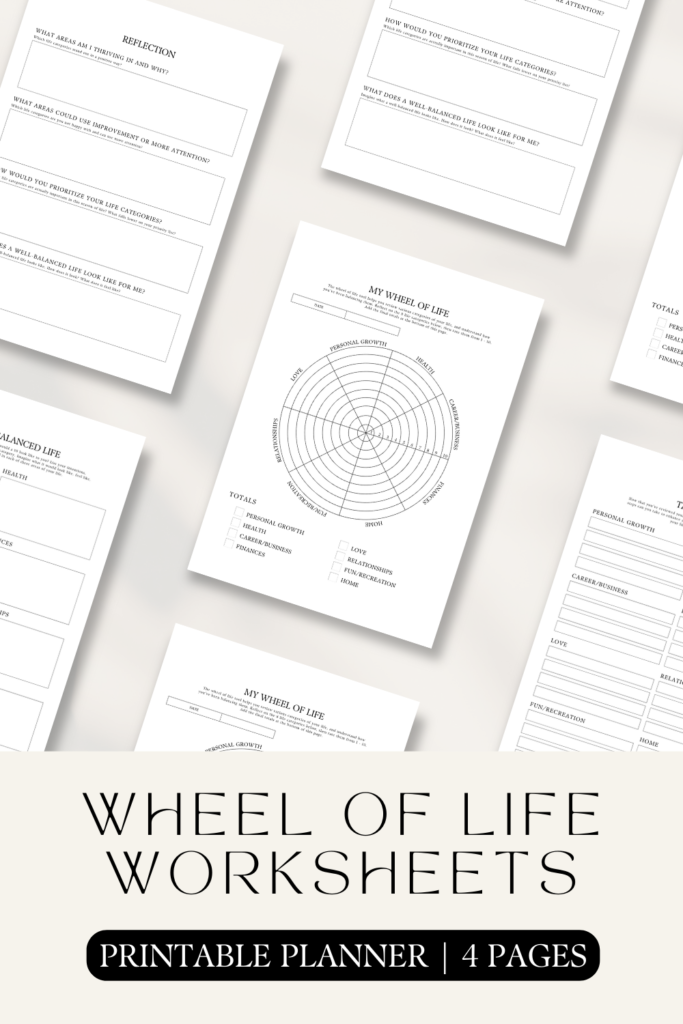If you’re looking to become more productive and make the most of each week, one of the best ways to do this is through having a rock-solid weekly planning routine. Consistently planning, reviewing, and tracking your week is the key to success! Discover the ultimate guide to weekly planning!

Disclosure: This post contains affiliate links. This means I may earn a commission should you chose to sign up for a program or make a purchase using my link. It’s okay – I love all of these companies anyways, and you will too!
Introduction
One of the most important and valued steps in my regular routine is weekly planning. This simple step has been a game-changer in my personal growth and development, contributing to mental clarity, productivity, and goals achievement.
This post will be an in-depth ultimate guide to planning your weekly schedule, with the goal of helping you reach success! Discover the benefits, the process, and my top tips for planning your week successfully.
As you read this guide, keep in mind that everything I share is based on my personal experiences and suggestions. You can always take what aligns with you, and leave what doesn’t. Make this process entirely yours and customize it until you find a system that works!
The most important piece is to find a system that allows you to be consistent. It’s better to have a short and consistent routine, than an intense routine that makes it tough to keep long-term.
Let’s get started!
The Benefits of Weekly Planning
There are plenty of benefits of weekly planning, and let me share the top benefits that I’ve experienced personally. There are plenty more beyond these, which you’ll discover over time!
1. Stay Organized
Planning each week ensures you don’t miss any events or important tasks that need to get done! You’ll also have peace of mind, knowing that you’re in control of your schedule.
2. Work Towards Your Goals
Your weekly plan will be built from your monthly, and yearly goals. By planning and reviewing your goals weekly, you have constant visibility on your goals and can check in on them often. Remember the saying: “What gets measured gets done.”
3. Track Your Personal Growth
Through your weekly planning process, you’ll be able to track your learnings, your progress, and your overall growth. I believe planning and journaling is a crucial step in our personal development.
4. Mental Check-In
By planning weekly and ideally daily, you can check in with yourself mentally. Stay on top of your thoughts and emotions. You’ll stay mindful and in control of your day-to-day.
5. Self-accountability
Ultimately, setting up a weekly plan is an opportunity for you to show up for yourself and your personal growth. Being accountable to ourselves can be tough, but truly transformational whenever we follow through.
How to Start Planning

In order to get started, get clarity on a few things:
1. When do your weeks start?
Note when you’d like to plan your weeks, whether starting the week on Sundays or Mondays.
2. When will this fit into your routine?
Get clear on when you’d like to add your planning process to your weekly and daily routine. Yes – for weekly planning to be most effective, we want to do a quick daily check-in as well!
3. Will you use digital or physical planners?
Or both! This is entirely up to you and how your preference. You can also test different options until you find a process that works for you. After testing this over many years, I’ve found that I prefer using a physical journal as well as Google Calendar. My favourite journal is the Leaders in Heels Planners, which I highly recommend. This is the journal that I keep coming back to each year!
Now that’s all sorted, let’s dive into the process itself!
Part 1: Start of the Week

1. Review monthly goals
At the start of each week, before even diving into your weekly plans, start with reviewing your monthly goals. If you have yearly goals, even better – glance at those too.
Reviewing your monthly goals helps you stay on track and review where you are in relation to goals. As you determine your progress, you can then ensure you incorporate tasks for that week that will help you move towards hitting your bigger goals.
2. Review the previous week
Glance over the previous week.
Ask yourself:
- What worked and didn’t work?
- What tasks didn’t get completed?
- What do you want to do more of and less of?
- What do you want to focus on this week?
Be honest with yourself and recognize what might need to change and adapt your schedule for the upcoming week.
3. Set 3 priorities for the week
The biggest hurdle when planning, is that we tend to overwhelm ourselves with too many “priorities”. Start with just 3 priorities. These are your game-changers.
Ask yourself:
- What will move the needle and make this week successful in your eyes?
- If only 3 things got accomplished, what would they be?
4. Write an intention for the week
Beyond all your goals and tasks, note done your main intention for the week. An intention represents your commitment and can be portrayed differently by each individual.
Ask yourself:
- How do you want to show up this week?
- What do you hope to get out of this week?
5. Note down important events of the week
Review all the events coming up for you this week. Make note of them and add them to your calendar accordingly. Ensure you’re not double-booking yourself and also assess if there are any events you want to add or remove.
6. Note down additional tasks for the week
Brain dump a list of all the additional tasks you’d like to accomplish that week. These may be of lower priority, but ideally still completed if time permits.
7. Allocate tasks and events into your calendar
Once you know which events are happening during the week, and once you have clarity on your priorities, add them to your calendar. Whether you use a digital or physical calendar, manually slot the tasks and events in to ensure they aren’t missed.
Part 2: Daily Check-In

A daily planning routine is key to hit all your weekly goals. It doesn’t need to be time-intensive. At this point, you’ve done the heavy lifting by planning at the start of the week. You simply want to check in and gain clarity on each day!
1. 3 Priorities for the day
Set 3 simple priorities for each day. This can be breaking down your bigger weekly priorities or any other important tasks that need to get done within that day.
2. Choose a Highlight
Specify the highlight of your day. This is one of my favourite takeaways from the book, Make Time. Essentially, “your Highlight gives each day a focal point.” This is the part that you can look forward to or an event/action that will make the day memorable. This can range from day-to-day.
For example, some past Highlights for me include: Date Night, See my family, Finish a book. It can be anything!
3. Set an Intention
Not only do we set weekly intentions, but it’s also always great to set daily intentions as well.
Ask yourself:
- How do you want to show up today?
- What do you hope to get out of this day?
4. Gratitude
Make a list of things you are grateful for. Having a daily gratitude practice allows you to start your day on the right note. When we’re in a state of gratitude, we attract more wonderful things into our life.
Part 3: End of the week

At the end of the week, you can review how the week went. This process is usually done before you plan for the next week. You can determine whether you’d like to do this alongside your planning process, or perhaps the day before.
1. Review Highlights
Review the biggest highlights of the week. What events did you attend? Who did you meet? What made this week awesome?
2. Celebrate Wins
Celebrate your wins and note them down! Did you hit an important goal? What accomplishments are you proud of?
3. Lessons Learned
Note down the main lessons you learned from the past week. Writing these down helps you keep a record of the things you’re learning about yourself and in life.
4. Gratitude
List down your gratitude for the week. The more gratitude, the better!
5. Focuses for next week
Note down your expected priorities for the upcoming week. Doing this after reviewing your past week keeps it fresh in your mind and simplifies the process for the upcoming week!
Tips for Planning

Now that we’ve gone through the weekly planning process, here are a few additional tips to make the most of this process!
Make it fun
Let your weekly planning session be a process you enjoy! Make your favourite beverage, play nice music, and set the mood for yourself. Let it be a time for yourself that you look forward to each week.
Treat yourself to cute notebooks and pens
Get a cute planner (I highly recommend this one), or any notebook that you like. Grab your favourite pens. This all helps to make the process fun and enjoyable, which will help you also stay consistent.
Don’t give up, even if you miss a day or weeks
Some weeks or days are busy, that’s normal. What’s important is to keep coming back to your routine. No matter how many weeks you may have missed, give yourself grace and just get back into it. Be kind to yourself!
Review your learnings
Don’t forget to review your learnings and take them with you in life! Celebrate the wins, reflect on what you can improve upon, and keep on learning. Years down the line, you can check your planner and see just how much you’ve grown!

Conclusion
There you have my ultimate guide for weekly planning! While it seems like a lot, the most important thing is to get started.
Take the first step. Pull out any notebook you have on hand, or even a digital notepad if you wish. All it takes is the right intention and the first step.
Wishing you all the best and may you hit all your wonderful goals!
What was your biggest takeaway?
Leave a comment below!
PIN FOR LATER



